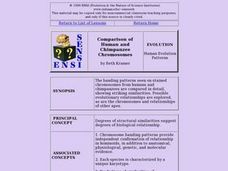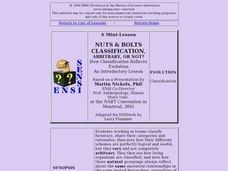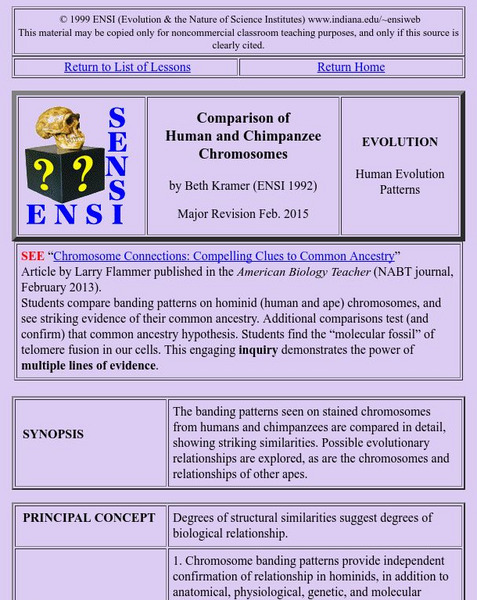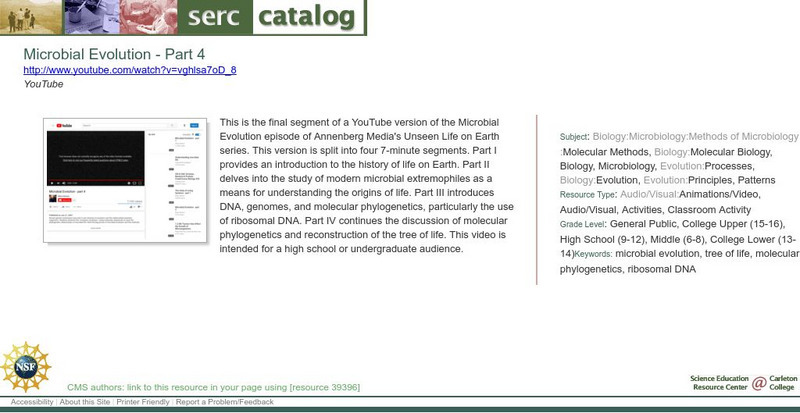Curated OER
The Case of Regulation in Cells
After your biologists have learned about transcription, translation, and gene regulation, they work in a small group to create a poster of a system that serves as an analogy of the gene regulation process. They share their creations with...
Curated OER
Asexual versus Sexual Reproduction
Students explore reproduction. They research organisms and groups of organisms to determine whether they reproduce sexually or asexually. In addition, they determine the organism's habitat.
Curated OER
The Chromosome Connection
Students evaluate the degree of chromosome similarity and difference between humans and apes. Students infer about the relationship between a human and ape based on similarities found.
Curated OER
Comparison of Human and Chimpanzee Chromosomes
Students actively engage in the careful analysis of chromosome banding patterns and identify examples of inversion in homologous chromosomes.
Curated OER
Species Diversity and Phylogeny
Students explore the classification system of organisms: taxonomy. They examine prepared slides of Protozoans and record information on a Taxonomy Recording Sheet. Two additional classifying activities are also included in this lesson.
Alabama Learning Exchange
Botany Scavenger Hunt Where's the Ginkgo?
Learners use a science journal to log plants that are native to Alabama. In this plant lesson plan, students identify characteristics, describe environments, and classify the plants that they find.
Curated OER
Superbugs and Antibiotic Resistance
High schoolers complete experiments on antibiotics and antimicrobials. In groups, they explain how antibiotics affect the evolution of microorganisms. They test various types of bacteria to discover how much resistance they have to...
Curated OER
Nuts & Bolts: is Classification, Arbitrary, Or Not?
Students, in groups, classify furniture, share their categories and rationales, then note how their different schemes vary, perfectly logical and useful, but completely arbitrary.
Curated OER
Human Evolution
Students make and use observations of Laetoli footprints to provide clues to life in the past. They collect and analyze data to study the relationship between foot length and body height.
National Health Museum
Access Excellence: Molecular Biology/primate Phylogeny
This lesson plan involves comparison of amino acids to create a phylogenetic tree of primates. Students will also use other species information to draw conclusions about evolutionary relationships.
Indiana University
Ensi: Comparison of Human: Chimpanzee Chromosomes Lesson
This is a great lesson plan that combines Karoytypes and evolution. Learners will recognize that the chromosomes of chimpanzees and humans are remarkably similar, then correlate that to their evolutionary relationship.
National Health Museum
Access Excellence: Making a Phylogenetic Tree Lesson Plan
Constructing phylogenetic trees may be a daunting task for young scholars, but this lesson plan is a simulation of what molecular biologists must do to determine relationships. This plan is for students who have a good grasp of DNA...
National Health Museum
Nhm: Amino Acid Sequences Show Evolution
This lesson plan focuses on differences in the amino acid sequence of hemoglobin and myoglobin proteins. They use the number of differences to create a phylogenetic tree.
Science Education Resource Center at Carleton College
Serc: Microbial Evolution: Part 4
YouTube video continues the discussion of molecular phylogenetics and reconstruction of the tree of life.













